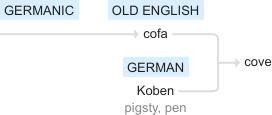Cove
Old English cofa ‘chamber, cave’, of Germanic origin; related to German Koben ‘pigsty, pen’. cove1 (sense 1) dates from the late 16th century.
wiktionary
From Middle English cove, from Old English cofa(“chamber; den”), from Proto-Germanic *kubô. Cognate with German Koben, Swedish kova. This word has probably survived as long as it has due to its coincidental phonetic resemblence to the unrelated word " cave".
Britain ante-1570. From Romani kodo(“this one, him”), perhaps change in consonants due to lower class th-fronting, or Romani kova(“that person”).
Compare French couver, Italian covare. See covey.
etymonline
cove (n.1)
early 14c., "den, cave, gollow nook," from Old English cofa "small chamber, cell," from Proto-Germanic *kubon (compare Old High German kubisi "tent, hut," German Koben "pigsty," Old Norse kofi "hut, shed").
Extension of meaning to "small bay, inlet, or creek" is from 1580s, apparently via Scottish dialectal meaning "small hollow place in coastal rocks" (a survival of an Old English secondary sense). Also in early Middle English, "chamber, closet, pantry," hence the legal phrase cove and keie "right of the mistress of a household to control 'pantry and key,'" that is, to manage the household (late 13c.).
cove (n.2)
"man, person, fellow, chap," canting slang from at least 1560s, said to be from Romany (Gypsy) cova "a thing," covo "that man" [Barrère and Leland].
